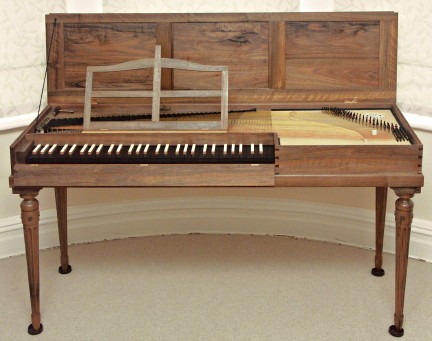This piece, much like the few before it, has transcended the 'I've heard this somewhere' label and has graduated to 'I've heard this everywhere.' Unlike the few pieces before this one, however, this was not a case of a small-scale work becoming surprisingly adored. No, George Frideric Handel's Messiah was beloved in its time, never suffered a dip in popularity, and continues to be performed nearly constantly (particularly around the holidays). But, as always, the story behind the piece (and of the man himself) is too good to pass up, and so here we are today.
 |
| Handel, looking only slightly incredulous. |
 |
| My-Size Clavichord, perfect for kids whose parents Just Don't Understand. |
Luckily for him, however, he was about to strike musical gold. In July of 1741, Charles Jennens wrote a letter to Handel (George by this time, having been adopted by the British as one of their own) mentioning a new libretto he had for an oratorio called Messiah.
At this point, I feel obligated to take a moment and explain the differences between opera and oratorio. On paper, they are very similar pieces of performance art; both feature orchestral accompaniment, a chorus, and vocal soloists. The difference - in theory at least - is in intent and subject matter. An opera is a musical work written for the stage, while an oratorio is generally thought of as a concert work. In terms of subject matter, operas tend to be mythological, historical, or literary, while oratorios tend to be based on sacred texts. However, Handel's oratorios (particularly Samson) are often staged, and his oratorio Semele caused incredible consternation due to its basis on Greek myth. If you are ever confused as to whether a work is an opera or oratorio, your best bet is to ask someone who has decided they know more about classical music than you and take their opinion as fact. It works for me.
 |
| I can only guess (and dread) what this sounds like. |
Messiah was premiered in Dublin in 1742 to great acclaim, but when it premiered in London, receptions were decidedly more lukewarm. Jennens himself was rather displeased, thinking that Handel's music did not do his libretto justice. However, after a slow start, Messiah became a beloved piece of British music that has never left the repertory since.
A fun fact: the performanace of "Hallelujah" above is based off an arrangement done by none other than Wolfgang Amadeus Mozart in 1789 on commission from one Baron von Swieten. Performances of Messiah got bigger and grander (one featuring a chorus of 2,000 and an orchestra of 500) until the twentieth century, when a revival in Baroque performance techniques led to an interest in hearing how it was performed at the time.
People do like things big, though, and so we can't always fault Andre Rieu - our conductor in the top video - for his excesses.
Further listening:
Like Handel, and also happiness? Try "Happy We" from Acis and Galatea (performed by Les Arts Florissants, sung by Paul Agnew and Sophie Daneman): http://www.youtube.com/watch?v=ESKvWcTh4AE
Interested in Handel's Italian opera? Try "Ciel e terra armi di sdegno" from Tamerlano (sung by Rolando Villazón): http://www.youtube.com/watch?v=8PnXEQKKp1U
Like Handel, and also really beautiful music? Try "Un momento di contento" from Alcina (sung by Kobie van Rensburg): http://www.youtube.com/watch?v=VrMHHGR_KR8
Yeah, I know. I like Handel. So should you.
No comments:
Post a Comment